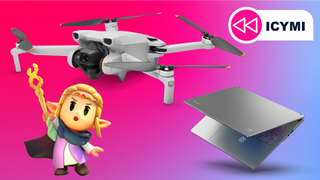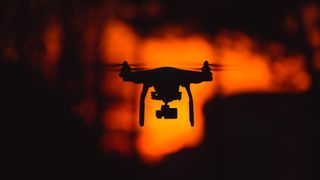ICYMI: the week's 7 biggest from potential DJI drone bans to new film cameras
Here's your firmware update for June 22, 2024

With few events this week, it should have been a quieter one in the tech world. Then, the US government had to start moving towards a DJI drone ban, which could have major consequences for amateur and professional photographers alike.
On top of this we saw the launch of CoPilot+ PCs with dedicated NPUs for AI tasks, a Legend of Zelda game that finally stars Zelda as its lead, and pro comedians tested AI's joke writing skills. Spoiler: they weren't good.
So let's get into this week's top news stories, and be sure to return next Saturday for another ICYMI news round-up.
7. A US DJI drone ban got one step closer

The US Government’s penchant for banning technology and innovation from unfriendly countries is extending beyond TikTok and to the flyers, or more precisely, DJI drones.
If you fly a drone in the US, you either use a DJI drone or know of them. The Chinese-based company essentially built the drone market in the US and owns about 75% of it. Now, though, there’s a bill making its way through the halls of Congress that could ban the sale and use of DJI drones in the US.
The reasoning is simple. Companies operating in China or deeply affiliated with the Communist country are often forced to share their data and technology with the communist party government. For the US, that’s an enormous red flag, and now officials are getting serious about, as they might tell you, protecting Americans from spying eyes.
When it comes to drones, you can almost understand the US government’s concern. The flyers communicate not only with pilots on the ground but with the cloud, sometimes transmitting data about location and other details. DJI, by the way, recently disabled the latter feature.
Get daily insight, inspiration and deals in your inbox
Sign up for breaking news, reviews, opinion, top tech deals, and more.
As for what’s next, pay attention to the TikTok case. The social media company just filed a huge brief calling its potential ban “unconstitutional.” If TikTok wins, that might bode well for DJI’s chances of avoiding similar action.
6. The Copilot+ PC era started as first laptops hit stores

AI has been literally everywhere in tech recently, and this week we saw the launch of the first CoPilot+ PCs – computers with a dedicated Qualcomm Neural Processing Unit (NPU) that can perform a variety of AI tasks locally.
Lenovo, Samsung, HP, Dell, and Microsoft have all launched CoPilot+ models, and while the AI couldn’t do everything for us when we tested them, it did at least lend a helping hand – aptly, just like a copilot.
If you want to give them a whirl, demo stations should be available at your local large tech store – we’ve seen them at stores like Best Buy – and it’s worth heading over to one to see what this AI hype is about.
- Read more: I asked a Copilot+ PC to make me a beach ball, it gave me what I needed if not what I wanted
5. Nintendo finally gave us a Zelda-led game
A common gaming meme is that people unfamiliar with the series often assume Zelda is the name of the lead protagonist of The Legend of Zelda games. Finally, they’ll be correct as Echoes of Wisdom was announced for September 26 at this week’s Nintendo Direct with the eponymous princess finally as its star.
During the presentation, we also got a new trailer for Metroid Prime 4 Beyond and Mario & Luigi: Brothership, as well as the announcement that Nintendo Switch Online was getting four new games – all of which were released on the day of the showcase.
This includes Metroid Zero Mission, Perfect Dark, Turok, and The Legend of Zelda: A Link to the Past – which includes an online multiplayer port of the original Four Swords game – starring our usual hero Link (and in Four Swords’ case, four of him).
4. Pro comedians tried (and largely failed) to get AI chatbots to be funny

If you’re sweating about losing your job to an AI chatbot one day, it might be time to try stand-up comedy. This week, a new study revealed just how bad the likes of ChatGPT and Google Gemini are when it comes to jokes – in fact, they make C-3PO look like a comedy genius.
The Google DeepMind study followed the experiences of 20 comedians, who all tried using their AI assistant of choice to create stage-worthy material. The results were largely bland tropes akin to “cruise ship comedy material from the 1950s, but a bit less racist.” Humor is still very much a beta feature for AI assistants, then, which is something of a relief.
3. Pentax launched a new film camera

We had our hands on the Pentax 17, the first film camera from one of the biggest names in analog photography in over twenty years. It's a new half-frame point-and-shoot compact developed by Pentax engineers past and present. It comes almost two years after the Pentax Film Project was announced, with one goal: to develop film cameras for today's TikTok generation.
Half-frame gives you twice the number of shots on a regular roll of 35mm film, in portrait format with the old school look – ideal for social. And the retro camera itself gave us the feels: the tactile controls, audible feedback of the film wind crank, and a gorgeous little viewfinder that displays the zone focusing mode and image area – a clever bit of design.
It took us a little while to warm up to the Pentax 17, and at $500 £500, it’s quite pricey, but after prolonged use, it has won us over. It makes a lot of sense for today’s market, where film photography is trending. We expect the Pentax 17 to be a very popular camera indeed.
2. Fujifilm unveiled the Instax Wide 400 camera
Fujifilm announced a replacement for its decade-old Instax Wide 300 with the brand new Instax Wide 400 – the biggest of its instant camera range ahead of Square and Mini.
If you’re looking to snap events with many guests, like a wedding, then the 99 x 62mm (3.9 x2.44in) prints are ideal for squeezing everyone into the frame. And while we think Instant printers might be better for most people – as you can print your choice of smartphone pictures rather than risking it with an instant camera click – there’s something delightful about these kind of cameras.
So, if you’re looking to pick one up, you should know it’ll cost you $149.99 / £129.99 (Australia pricing TBC). Meanwhile, packs of Instax Wide film start at $18.99 / £16.99 for a twin pack of 10 regular color sheets.
1. Xreal made a smartphone-like for its AR glasses

This week Xreal announced the Beam Pro. While it looks like a smartphone – complete with a 6.5-inch LCD 2K touchscreen and dual 50MP cameras on its rear – it’s not.
Instead, it’s designed as an add-on for Xreal’s AR smart glasses, so you have a guaranteed way to stream games and shows to the immersive wearable HD cinemas that Xreal has created, like the Xreal Air 2.
Best of all, the Beam Pro costs just $199 / £189 for the 6GB of RAM / 128GB storage model, while the 8GB of RAM / 256GB storage model will set you back $249 / £239. Preorders are live right now at XREAL.com for the United States and the United Kingdom; availability and pricing for Australia are TBC.

Hamish is a Senior Staff Writer for TechRadar and you’ll see his name appearing on articles across nearly every topic on the site from smart home deals to speaker reviews to graphics card news and everything in between. He uses his broad range of knowledge to help explain the latest gadgets and if they’re a must-buy or a fad fueled by hype. Though his specialty is writing about everything going on in the world of virtual reality and augmented reality.
- Timothy ColemanCameras editor
- Mark WilsonSenior news editor
- Lance UlanoffEditor At Large
Most Popular

